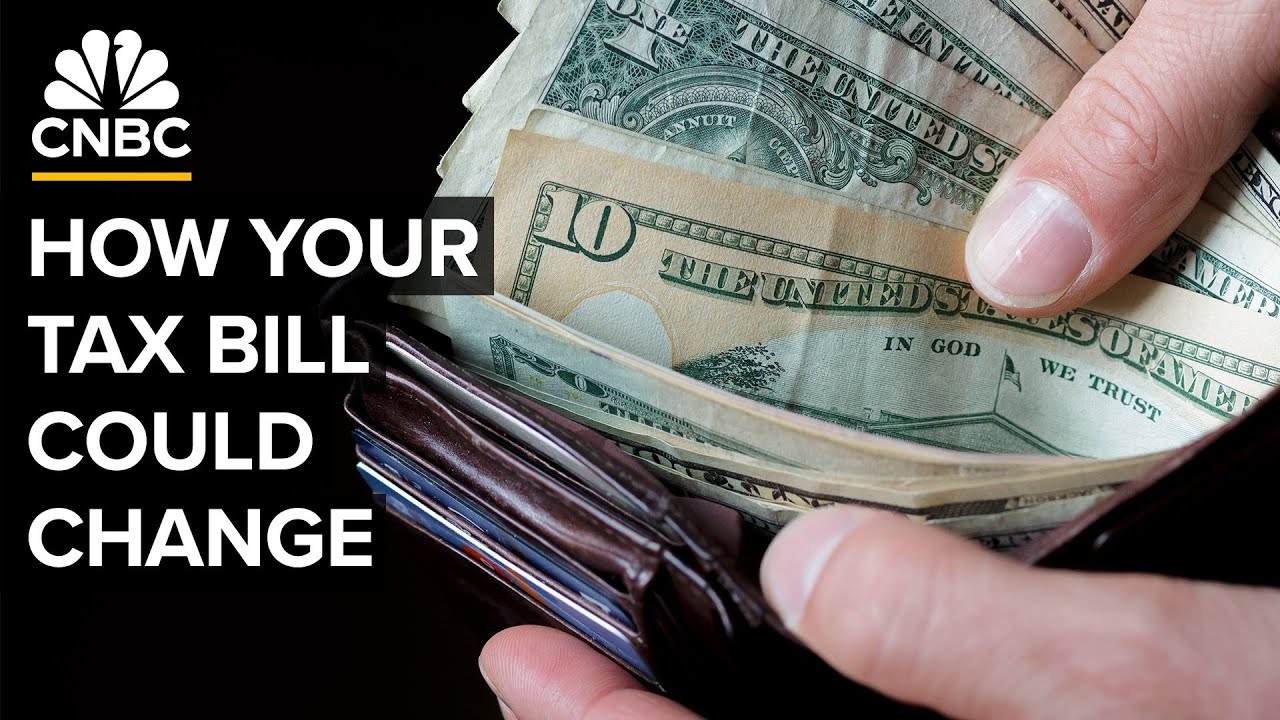56% of Americans say they pay too much in federal
income tax, and only 22% believe They receive valuable services from those taxes. At the same time, 57% of Americans say reducing the
budget deficit should be a top priority for The President and Congress. We need to keep a very robust income tax system in
order to pay for the spending that we want. An alternative to balancing the budget is cutting
spending, but spending Cuts would result in a lower standard of living, by
and large, for many Americans. Taxes are a big deal in the 2024 election cycle. Some people have been referring to 2025 as "Tax
Armageddon" or the "Super Bowl of Taxes." And that is when a bunch of provisions from
the Tax Cuts and Jobs Act that was enacted in 2017 will be sunsetting. If the 2017 tax cuts are allowed to expire after 2025. About 62% of taxpayers would see their tax bills go up
and that's because the TCJA provided Tax cuts for the vast majority of taxpayers. This means the 2024 elections will determine which
political party will get to shape Americans taxes for Years to come. Vice President Harris views the tax code as a tool to
advance Her economic and social goals. Trump's basic tax plan is to cut tax rates
domestically and Increase tariffs on products that are imported. Here's what former President Trump's and Vice President
Harris's tax plans would mean for your wallet. The 2017 Tax Cuts and Jobs Act, or the TCJA, was one of
the Trump administration's Defining policies. If it is allowed to expire, the vast majority of
Americans would see their tax bills go up. The average American saved on taxes as a result of the
Tax Cuts and Jobs Act, but the Saving was disproportionate. A middle income taxpayer saved about $900 by 2025,
whereas The top 1% saved about $61,000, according to estimates
from my shop, the Tax Policy Center. For example, one of the things we did in that bill was
we doubled the standard deduction. So today in America, only 9% of Americans itemize
their deductions. That's an amazing thing. That's a record low. That was one of the greatest tax simplification
measures.
On the campaign trail. Trump has put forth additional
policy proposals he would pursue on top of extending The tcja. He's talked about exempting tip income from taxes
entirely, and he's talked about Exempting Social Security benefits from taxes. To exempt Social Security from taxation would
accelerate Medicare insolvency by six Years and Social Security's insolvency by one year. It's a pain point for seniors who are hit by that tax. And Social Security is such a key issue during this
election that it's easy to understand why he may have Proposed that. If Trump wins the 2024 election and is able to enact
his plan into law, the average American's tax return Will likely remain mostly unchanged since he plans to
extend the 2017 TCJA. However, these tax cuts may lead to a significant
increase in the federal deficit. The Tax Cuts and Jobs Act from the start was going to
grow the federal debt. Congress budgeted itself $1.5 trillion of extra tax
cuts. The Republicans pursued a strategy of borrow and
spend. In effect, they understand that cutting taxes would
increase the deficit. I think their theory is that cutting taxes pay for
themselves eventually by Spurring more economic growth. I don't think we saw that. I think very few people believe tax cuts pay for
themselves. But tax cuts are immensely popular. Everything we have to do should be oriented towards one
thing increasing the rate of economic growth of our Country. The Congressional Budget Office, or CBO, estimates an
extension of the TCJA would cost the federal government More than $4.5 trillion over ten years, including
interest payments on the debt. That's about a $1.1 trillion increase from the CBO's
projections in 2023. It did cut taxes. It also stimulated new investment, a little bit more
growth, which raises tax revenue Elsewhere. But even accounting for those positive
benefits, it still cut taxes, increased deficits And ultimately increased debt. Taxes support our spending. And in the long run, taxes and spending need to
balance. In the short run, we can borrow to spend, but
eventually we will Need to repay that borrowing.
The US borrows a lot for its spending relative to
other industrial countries. We tax relatively lightly, but spend comparably to
other industrial Countries. That leaves our deficit growing. When we're borrowing that money, it tends to come from
foreign investors. So the returns that we have to pay for borrowing that
money go to foreigners rather than those returns going To Americans. So it does decrease income somewhat. It's not entirely clear how Harris would deal with the
Tax Cuts and Jobs Act. The administration's budget this year noted that they
would continue those policies for people making under $400,000. That's pretty much 98% of taxpayers. So in a way, you could say that Trump and Harris agree
on the tax cuts for about 98% of the Population. I believe Vice President Harris wants to advance a care
economy. That is, to provide for the help that Americans need
for basic services. And those basic needs and resources include a living
stipend, Rental assistance, housing assistance. Unfortunately, what Kamala Harris wants is not tax
reform. It's tax reform. She wants to raise the tax rates, which is like a
hurdle for the US economy. And then she wants to create all these new loopholes
that just becomes, you know, a field day for tax Accountants and lobbyists. Like Trump, Harris has pledged to do away with federal
income tax on tips. But one component of Harris's plan that differs from
Trump's is increasing a partially refundable child tax Credit. The child tax credit was designed to help low to
moderate income families. It's a benefit for people with kids. Republicans and Democrats differ on some basic design
issues for the child tax Credit, most notably whether the credit will be
refundable or not. A refundable tax credit gives you the ability to get
money back as a refund, even when you have no Tax liability for the year, so it can be really
beneficial to lower earners who wouldn't otherwise owe Taxes. So Republicans favor the tax credit, especially for
middle class and higher Income taxpayers, whereas Democrats favor the tax
credit all the way up and Down the income ladder. In 2017, the Tax Cuts and Jobs Act, the Republican
bill doubled from $1000 to
$2000 the child tax credit. And then later, as part of President Biden's American
Rescue Plan, the child Tax credit was increased even more and was made
refundable. But Biden could not bring along any Republican votes. So basically, the Republicans favor more children tax
credits, but the Democrats favor them even more. Harris's plan also gives qualifying households with a
newborn a $6,000 tax credit. Additionally, she proposed a tax credit worth up to
$25,000 for some first time home Buyers. Many of the housing policies are designed to boost
demand for housing rather than Address the fundamental issue, which is supply
constraints. Providing tax credits for home buying, it sounds nice,
but a lot of that will Just funnel into the price of buying a home and
ultimately not be effective in helping Increase homeownership and increasing the housing
supply. You have to look at the cost of housing and regulations that are holding back building if you Really want to address housing affordability. Harris has put forth policies that will bring in
revenue to offset the tax credits, mainly by taxing Corporations and the wealthy at higher rates. The campaign has said they would maintain a commitment
to fiscal responsibility, and they have highlighted Asking the wealthiest Americans and large corporations
to pay their fair share. Harris has also endorsed Biden's budget for 2025, which
includes a 25% minimum tax on Individuals with more than $100 million in wealth,
based on a combination of their income and Unrealized capital gains. Harris has also put forward a plan that includes a 28%
tax on long term capital gains for any Household with an annual income of $1 million or more,
which is lower than Biden's proposed 39.6% rate. Vice President Harris in August proposed an increase of
the corporate tax rate would boost that up to 28%, up from 21%, which aligns with President Biden's
fiscal year 2025 Budget. The through line, I think, is imposing higher taxes on
businesses and Entrepreneurs and the wealthy, and then using that to
redistribute income toward other Parts of the economy, whether that's families or
homebuyers. So really increasing the role and the scope of the
federal government and using the tax code as a tool For doing that.
If Harris wins the 2024 election, the average American
making under $400,000 would likely see their Current tax rates maintained, along with the potential
for additional benefits from expanded tax credits. Lower income Americans might receive more benefits
through refundable tax credits. It's unclear whether Harris's revenue raisers would be
enough to offset the additional tax credits. In August 2024, Vice President Harris unveiled a number
of economic proposals. And that collection of proposals, the Committee for a
Responsible Federal Budget estimated that that could Increase the deficits by $1.7 trillion over a decade. The Harris campaign did not provide comment to CNBC in
time to participate in this report. Roughly 6 in 10 Americans say it bothers them a lot
when corporations don't pay their fair share, and Another 60% say the same about wealthy people. There is, however, a significant partisan divide, with
85% of Democrats and only 45% of Republicans supporting higher corporate taxes. From the business side, the Tax Cuts and Jobs Act
created a new international tax regime, much more Sensible, actually, than the old one. The only problem, in my view, was that the Tax Cuts
and Jobs Act set the corporate tax rates too Low. The corporate tax rate reduction was kind of one of the
jewels of the 2017 tax cuts. And we did this not because we love corporations, but
because we love jobs. And we want jobs located here in the United States. If you look at the situation before Trump was President, as Trump put it, it was like we were putting A tariff on our own goods and services. And what country does something like that? So we took that top tax rate down from about 40%, down
to about 25% When you include the state and local taxes, and that
put America back in the game. Another complicating factor with Harris's proposal to
increase the corporate tax rate back up To 28%, the TCJA lowered it from 35% to 21%. So it might sound like a 28% is just halfway back to
where it used to be. But the TCJA also made significant changes to the
corporate tax base. So the base is a lot broader now, meaning that when
you raise the rate, you're actually doing more than Just taking back half of the rate cut. You're going further than that because you're taxing a
greater share of corporate income than was taxed Before. In direct comparison to Harris's plan, Trump has
proposed lowering corporate tax rates further.
The TCJA set them at 21%. Trump told Bloomberg Businessweek he hopes to drop
rates as low as 15%. The Tax Foundation estimates that cut would reduce
federal revenue by roughly $460 billion Over ten years. Another policy he has talked about that harkens back to
his first administration is imposing more Tariffs, potentially a 10% or 20% universal tariff
plus a 60% tariff on everything we buy from China. Trump's tariffs would only replace about 8% of the $34 trillion of federal income tax that the CBO
expects to collect year after year, so Tariffs cannot replace income taxes. He wants to impose what is, in effect, a national sales
tax On everyday products and basic necessities that we
import from other Countries. That will devastate Americans. Tariffs have a similar burden as a sales tax. They apply to goods that we purchase from foreign
businesses. They ultimately fall on consumers. But I think economically it has a very similar burden
to a sales tax. Having worked with Trump on the tariff issue, he really
does believe in reciprocity. He believes in kind of tit for tat. If you're going to hit us, we're going to hit you. And I've seen him use tariffs very effectively as a
negotiating Tool to get other countries to do things that are
America's interests. It's ironic that Kamala Harris's attacking Trump on
tariffs. President Biden chose to maintain many of Trump's
tariffs and has also imposed new ones on targeted Chinese imports. But Trump implemented more wide ranging tariffs,
including on steel and aluminum from various countries. In the end, it won't just be up to the president to
decide which policies are implemented. The reality is is that any type of tax changes would
need to be approved by Congress, and so it will Depend on which party controls both chambers, as well
as who controls the White House as to what we might See or not see happen after 2025.





